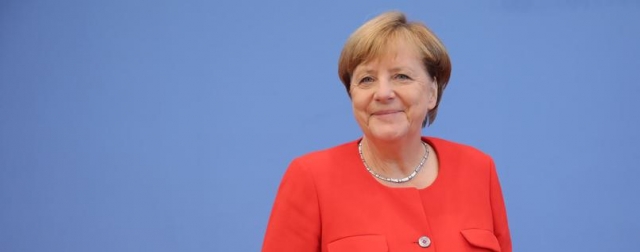What to Expect from the Merkel Visit
On August 23, Angela Merkel begins her South Caucasus trip. The German Chancellor will visit all the three countries (Armenia, Azerbaijan, and Georgia) with her first visit to be Tbilisi.
Merkel makes her trip to the region following her recent meeting with the Russian President Vladimir Putin near Berlin, Germany.
There is a string of issues the German Chancellor will have to discuss. Each South Caucasus country has its own long-standing geopolitical problems with neighboring countries, but there are also issues which have regional repercussions.
From a diplomatic point of view, Merkel could voice support for each South Caucasus country in the spheres where Russia is a geopolitical contester and the German leader might use the South Caucasus as a negotiating card in dealings with Moscow. In Georgia, Merkel will again face the fact of the Russian military presence in Abkhazia and Samachablo (so-called South Ossetia). The country is aspiring to become a NATO member, while economic and political relations with the EU progress.
For Merkel, Georgia is a sensitive issue. She will have to tread carefully not to offend the Georgian government nor risk deteriorating the relations with Moscow. However, she will be sending diplomatic signals to Moscow by visiting the occupation line (built by Russians) which separates Samachablo from the rest of Georgia.
According to the Georgian Ministry of Foreign Affairs, the German Chancellor will be accompanied by a group of German businesspeople, who will attend a joint Georgian-German business forum in Tbilisi.
Moreover, Georgia is also an important component in the southern gas and oil corridor, which leads us to, arguably, the most important part of Merkel’s tour – Azerbaijan. Criticized by US President Donald Trump as being too close a partner of Moscow and relying too much on Russian gas supplies, for the German leader, the visit to Baku will be a good opportunity to discuss the development of a southern pipeline to deliver gas to Europe from the Caspian.
This shows that Germany is hard pressed by the US, that a total reliance on Russians gas can be politically detrimental. This is not to say that Berlin will abstain from implementing the Nord Stream 2 through the Baltic Sea. However, Merkel will encourage Azerbaijan to work further on increasing the capabilities of the southern gas corridor. Berlin understands that gas in Azerbaijan is not totally sufficient to replace the Russian resources. Azerbaijan plans to launch the second stage of a gas pipeline from the large Shah Deniz field to Europe, which is expected to produce some 16 billion cubic meters (bcm) of gas a year starting from 2020. Approximately 10 bcm will go to Europe, the rest to Turkey and Georgia. If we compare this with what Russia can export via the Nord Stream 2, it is clear that Moscow’s plans to double Russia's export capacity to Europe to 110 bcm will remain dominant.
However, there is also one interesting piece in this diplomatic tour which has remained largely ignored by the public. If the Shas Deniz is not able to fully compete with the Nord Stream, the Trans-Caspian Pipeline (TCP) could potentially challenge this assumption. A couple of weeks ago, a consensus was reached between the Caspian Sea states to settle some of the most important questions considering the Sea. One of the provisions states that the countries can now lay pipelines underwater if all the parties, through whose territories the pipeline would go, agree.
In Armenia, Merkel will acquaint herself with the revolutionary government of Nikol Pashinyan. The question of Nagorno Karabakh will be discussed as well as Armenia’s foreign policy prospects. Overall, Merkel might send some positive signals to both Baku and Yerevan on the EU willingness to deepen cooperation with the two countries. Thus, the energy, military and security situation in the South Caucasus will likely be the German Chancellor’s main topics of discussion.
By Emil Avdaliani
Image source: tagesspiegel.de/ MICHAEL KAPPELER/DPA












